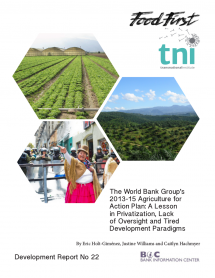The World Bank Group’s 2013-15 Agriculture for Action Plan A Lesson in Privatization, Lack of Oversight and Tired Development Paradigms
A look at the history of the World Bank’s approach and the crises that led up to the Agriculture for Development report. And a review and discussion of the Action Plan including examples of the challenges peasants face in the wake of World Bank Group projects.

Descargas
Autores
Executive Summary
Released in January 2013, the World Bank Group 2013-2015 Agricultural Action Plan provides a roadmap for the second phase of operationalizing the World Development Report 2008: Agriculture for Development. Ostensibly, the Plan is designed to improve rural livelihoods and support global food security by addressing climate change, rural gender inequality, market access and investment needs for agriculture. The Plan acknowledges both the importance of small-scale producers in the global agricultural system and the need for climate-resiliency. In these aspects, it is an accurate reflection of the Bank’s 2008 World Development Report that reversed decades of institutional disinterest in agriculture. The Report and the Action Plan also prepare the institutional ground for the market-led development of agriculture and a dominant role for the privatesector in institutional lending.
In the following report, we outline the history of the World Bank’s approach and the crises that led up to the Agriculture for Development report. We review and discuss the Action Plan, and then offer three case studies and numerous examples of the challenges peasants face in the wake of World Bank Group projects.
We question whether the Bank’s strategy will actually improve rural livelihoods, reduce rural poverty, end rural hunger and build climate resiliency, and find that the World Bank continues to operate from long-held, faulty assumptions regarding both agriculture and development. The Action Plan prioritizes public-private partnerships; increased access to conventional agricultural inputs and ‘improved seed varieties’; demographic shifts away from agriculture; and the opening of domestic markets to global agribusiness. Moreover, the Bank is increasingly shifting funding into its private arm, the International Finance Corporation (IFC) and supporting the financialization of agriculture through projects like corporate-backed index-based climate insurance. Through a combination of its own policies and a failure to enforce safeguards, the World Bank Group and the corrupt businesses and governments that it frequently backs are supporting dislocation, lost land (land grabs) and the erosion of traditional, diversified farming practices and social support networks. We argue that these are not aberrations but the tragic result of a development agenda that supports the interests of private companies at the expense of small-scale farmers and those who depend upon them for food security. We call on the Bank to scale back the activities of the IFC, scale up the enforcement of safeguards and truly support small-scale agroecological production.